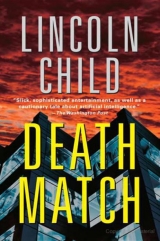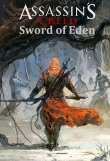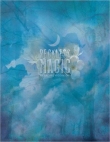
Текст книги "Death Match"
Автор книги: Lincoln Child
Соавторы: Lincoln Child
Жанр:
Триллеры
сообщить о нарушении
Текущая страница: 4 (всего у книги 26 страниц)
SEVEN
After the dry high-altitude air of Flagstaff, New York City felt damp and miserable. Lash wore a heavy raincoat as he approached the reception desk in Eden’s lobby for the second time in five days.
“Christopher Lash to see Edwin Mauchly,” he told a tall, thin man behind the counter.
The man tapped a few keys. “Do you have an appointment, sir?” he asked with a smile.
“I left him a message. He’ll be expecting me.”
“One moment, please.”
As he waited, Lash turned to gaze around him. There was something different about the lobby today, but he wasn’t quite sure what it was. Then he realized there was no line of prospective applicants this morning. The twin escalators leading to Application Processing were empty. Instead, a smaller flow of traffic was headed for the security checkpoint. They were all couples, many hand in hand. Unlike the anxious, hopeful faces he’d seen his last visit, these people were smiling, laughing, chattering loudly. After showing laminated cards at the checkpoint, the couples moved on to a large set of doors and vanished out of sight.
“Dr. Lash?” the man at the desk said.
Lash turned back. “Yes?”
“Mr. Mauchly is waiting for you.” The man slid a small ivory passcard emblazoned with Eden’s infinity logo across the desk. “Please show this at the elevator station. Have a pleasant day.”
When the elevator doors opened onto the thirty-second floor, Mauchly was waiting. He nodded to Lash, then led the way down the corridor to his office.
Director of Facilitation Services, Lash recalled as he followed Mauchly. Whatever the hell is that?Aloud, he asked: “Why all the happy faces?”
“Sorry?”
“Downstairs, in the lobby. Everybody was grinning as if they’d won the lottery or something.”
“Ah. Today is class reunion.”
“Class reunion?”
“That’s our term for it. Part of our client contract calls for a mandatory six-month revaluation of the couples we’ve brought together. They return for a day of one-on-one sessions, encounter groups, the like. For the most part, quite informal. Our researchers find the back-end data helpful in refining the selection process. And it allows us to watch for any signs of incompatibility, warning signals, between couples.”
“Seen any?”
“None to date.” Mauchly opened the door, ushered Lash inside. If he was curious, it did not show in his dark eyes. “Would you care for any refreshment?”
“No thanks.” Lash slipped his satchel from his arm and took the indicated chair.
Mauchly sat down behind his desk. “We didn’t expect to hear from you so soon.”
“That’s because there’s not much to tell.”
Mauchly raised his eyebrows.
Lash leaned over, unfastened his satchel, and pulled out a document. He straightened its edges, then placed it on the desk.
“What is that, Dr. Lash?” Mauchly asked.
“My report.”
Mauchly made no move to pick it up. “Perhaps you could summarize it for me.”
Lash took a deep breath. “There are no indicators for suicide in either Lewis or Lindsay Thorpe. None at all.”
Mauchly folded one muscular arm over the other, waited.
“I’ve spoken to family, friends, doctors. I’ve examined their credit histories, financial records, employment status. I’ve called in favors from federal and local law enforcement. This was as functional, stable a couple – a family—as you’ll ever find. They could have been poster children for that wall of happy faces down in your lobby.”
“I see.” Mauchly’s lips pursed into what might have been a frown. “Perhaps there were prior indicators that—”
“I looked there, too. I checked school records, interviewed teachers, spoke with former classmates. Nothing. And no psychiatric history, either. In fact, the only hospital visit was by Lewis, who broke a leg skiing in Aspen eight years ago.”
“Then what is your professional opinion?”
“People don’t just commit suicide for no reason. Especially double suicide. There’s something missing here.”
“Are you implying—”
“I’m not implying anything. The police report reads suicide. What I mean is, I don’t have enough informationto form an opinion on why they did what they did.”
Mauchly glanced at the report. “It appears you’ve done a thorough investigation.”
“What I need is in this building. Your evaluations of the Thorpes might give me the psychological data I need.”
“You must know that’s out of the question. Our data is confidential. Trade secrets are involved.”
“I’ve already signed a nondisclosure agreement.”
“Dr. Lash, it’s not my call to make. Besides, it’s unlikely you’d find anything in our test results you have not already found on your own.”
“Perhaps. Perhaps not. That’s why I’ve also prepared this.” Lash withdrew a small envelope and placed it atop the sheaf of papers.
Mauchly cocked his head inquiringly.
“It’s a breakdown of my expenses. Time billed at my usual consultation rate of $300 an hour. I didn’t charge overtime. Airplane tickets, hotel rooms, rental cars, meals, it’s all there. Just a shade over $14,000. If you’ll initial the amount, I’ll write you out a check for the balance.”
“What balance would that be?”
“The rest of the hundred thousand you gave me.”
Mauchly reached for the envelope, withdrew the folded sheet inside. “I’m not sure I understand.”
“It’s quite simple. Without more information from you, there’s nothing I can say except Lewis and Lindsay Thorpe were just as perfect a couple as your computer thought they were. I didn’t earn a hundred thousand to tell you that.”
Mauchly studied the paper for a moment. Then he replaced it in the envelope and put it back on the table. “Dr. Lash, would you excuse me for just a moment?”
“Of course.”
Mauchly stood and, with a polite nod, left the room, closing the door behind him.
It was perhaps ten minutes before Lash heard the door open again. He turned to see Mauchly standing in the corridor.
“This way, if you please,” he said.
Mauchly led Lash to a new elevator. It descended briefly, then opened onto a featureless corridor. The walls, floor, and ceiling were all painted the same shade of pale violet. Mauchly led the way down the corridor, then stopped to open a door the same color as the walls and ceiling. He gestured Lash to enter first.
The space beyond was long and dimly lit. From a narrow floor, the walls angled outward at a forty-five-degree angle to waist level, where they became abruptly vertical. It felt to Lash like staring down a funnel.
“What kind of place is this?” he asked, walking forward.
Mauchly closed the door and pressed a button on a nearby control panel.
There was a low whirring noise, and Lash took an involuntary step toward the center. On both sides, a dark curtain drew back along the angled walls at his feet. And now Lash realized that they were not walls at all, but windows, looking down into two large rooms: one to his left, the other to his right. They were standing on a catwalk, suspended above and between the two identical rooms: conference rooms containing large, oval tables. Perhaps a dozen people were seated around each. There was no sound but Lash could see from their gestures they were talking animatedly.
“What the hell—” he began.
Mauchly gave a dry laugh. Yellow light from the conference rooms lit his face from below, giving his smile a disconcerting cast. “Listen,” he said, pressing another button.
The room was suddenly filled with a babel of voices. Mauchly turned to the panel, adjusted a knob, and the volume decreased.
Lash realized he was hearing the conversations of the people in the room below. Another moment and he realized they were all couples who had been brought together by Eden. They were joking, sharing reminiscences about the experience.
“I’ve told seven, maybe eight friends about it,” a man was saying. He was in his early forties, black, wearing a dark suit. A woman was sitting close beside him, head resting on his shoulder. “Three have already applied. A couple more are saving up. One of them’s even thinking of turning in his Saab for a used Honda to raise the fee. That’s desperation.”
“We haven’t told anybody,” said a young woman across the table. “We like keeping it a secret.”
“It’s a blast,” her husband added. “People are always telling us how great we are for each other. Just last night a couple of the guys cornered me at the gym. They complained their wives were all bitches, wondered how I was lucky enough to find the last nice girl on Long Island.” He laughed. “How could I tell them Eden brought us together? It’s too much fun taking the credit myself.”
This brought a burst of assenting laughter from the group.
Mauchly reached for the dial again, and the laughter faded out. “Dr. Lash, I believe you feel I’m being intentionally coy about all this. That is not the case. It’s not that we don’t trust you. It’s simply that secrecy is the only way to protect our service. There are any number of would-be competitors who will do whateverit takes to obtain our testing techniques, our evaluation algorithms, anything. And remember, the secrecy is not just for us.” He gestured toward the other room below them, turned another knob.
“… if I’d known just what was in store for me, I don’t know if I’d have had the cojonesto take that eval,” a tall, athletic-looking man in a crewneck sweater was saying. “It was a brutal day. But now that it’s seven months behind me, I know it was the best thing I ever did.”
“I went to a typical online dating service once, a couple of years back,” another added. “Couldn’t have been more unlike Eden. Crude. Low-tech. They only asked a few questions. And guess what the first one was: Are you interested in a casual or a serious relationship? Can you believe it? I was so insulted I walked out the door right then!”
“I’ll be paying off the loan for years,” said a woman. “But I’d have paid twice as much. It’s like they say on that wall in the lobby. What price can you put on happiness?”
“Anybody here ever fight?” somebody else asked.
“We disagree,” a silver-haired woman at the far end responded. “Wouldn’t be human if we didn’t. But it just helps us learn more about each other, respect each other’s needs.”
Mauchly turned off the sound again. “You see? It’s for them, as well. Eden provides a service nobody’s ever dreamed of before. We can’t take any chance, no matter how small, of compromising that service.” He paused. “Now listen. I’m bringing in someone you can talk to, ask a few questions. But you must understand, Dr. Lash: he doesn’t know. Morale at Eden is exceptionally high. People are very proud of the service they provide. We cannot undermine that, even with an unrelated tragedy. Understood?”
Lash nodded.
As if on cue, a door opened at the far end of the room and a figure in a white lab coat stepped forward.
“Peter, there you are,” Mauchly said. “Come and meet Christopher Lash. He’s doing some random follow-up checks on a few of our clients. For statistical purposes.”
The man came forward with a shy smile. He was little more than a youth, really. There was an abundance of carrot-colored hair above his forehead that bobbed slightly as he shook Lash’s hand.
“This is Peter Hapwood. He’s the evaluation engineer that did the one-on-one with the Thorpes when they came back for their class reunion.” Mauchly turned to Hapwood. “Do you remember Lewis and Lindsay Thorpe?”
Hapwood nodded. “The supercouple.”
“Yes. The supercouple.” Mauchly turned his hand toward Lash, palm extended, as if inviting questions.
“In the one-on-one with the Thorpes,” Lash asked the young engineer, “did anything stand out in particular?”
“No, nothing. Not that I can remember.”
“How did they seem?”
“They seemed happy, like everybody else on their return interview.”
“How many couples have you interviewed? On their six-month return, I mean?”
Hapwood thought a moment. “A thousand. Maybe twelve hundred.”
“And they’ve all been happy?”
“Without exception. After all this time, it still seems uncanny.” Hapwood shot a quick look at Mauchly, as if wondering whether he’d said something inappropriate.
“Did the Thorpes say anything about their lives since meeting each other?”
“Let me think. No. Yes. They’d recently moved to Flagstaff, Arizona. I remember Mr. Thorpe saying he was having a little trouble with the altitude – he was a jogger, as I recall – but they both loved the area.”
“Anything else come up in the questions?”
“Not really. I just went through the standard question set. Nothing got flagged.”
“What standard set is that?”
“Well, we start with the mood-setting items, just to establish a comfort level, by—”
“I don’t think such specifics are necessary,” Mauchly said. “Any other questions?”
Lash felt the opportunity slipping away from him. And yet there were no other questions left. “You don’t recall anything they said, or mentioned, out of the ordinary? Anything at all?”
“No,” Hapwood replied. “Sorry.”
Lash’s shoulders sagged. “Thanks.”
Mauchly nodded at Hapwood, who headed for the far door. Halfway there, he stopped.
“She hated opera,” he said.
Lash looked at him. “What?”
“Ms. Thorpe. When they came into the consultation room, she apologized for being late. On the way here, she refused to take the first cab they hailed because the driver was blaring opera from his radio. She said she couldn’t stand it. Took them ten minutes to find another.” He shook his head at the memory. “They were laughing about it.”
He nodded to Lash, then Mauchly, and left the room.
Mauchly turned, spectral in the glow of the rooms below, and raised a bulky manila envelope. “The results of the Thorpes’ inkblot tests, administered during their evaluations. It’s the only test we give that isn’t proprietary, that’s why I am able to share it.”
“Big of you.” Frustration gave an edge to Lash’s voice he didn’t intend.
Mauchly regarded him mildly. “You must understand, Dr. Lash. Our interest in what happened to the Thorpes is as a case study only. This is a tragic event, one that’s especially painful to us because a supercouple was involved. But it’s an isolated occurrence.” He handed the folder to Lash. “Look these over at your convenience. It’s our hope you’ll continue to investigate, search for any personality issues we should keep in mind for future evaluations. But if you still want to quit the job, we’ll accept the brief you’ve already prepared. In any case, the money is yours to keep.” He gestured toward the door. “And now, with your permission, I’ll see you back to the lobby.”
EIGHT
The afternoon shadows were lengthening when Lash pulled into the Greenwich Audubon Center, parked, and started down the wood-chipped path leading to Mead Lake. He had the place to himself: the school groups had left hours before, and the weekend birders and nature photographers wouldn’t gather until the weekend. The dampness of the morning had given way to limpid sunlight. Around him, open woodlands melted away into fastnesses of green and brown. The air was heavy with the scent of moss. As he walked, the traffic on Riversville Road grew fainter. Within minutes, it was replaced entirely by birdsong.
He had left the offices of Eden Incorporated intending to drive straight back to his Stamford office. The week he’d allowed for this assignment was up, and he now had to decide what, if anything, was to be done about next week’s arrangements. But halfway home he’d found himself leaving the New England Thruway and driving, almost aimlessly, through the shady lanes of Darien, Silvermine, New Canaan, the stomping grounds of his youth. The Thorpes’ inkblot tests lay, untouched, in an envelope on the passenger seat. He’d driven on, letting the car decide where to go. And it ended up here, at the nature preserve.
It seemed as good a place as any.
Ahead of him the pathway forked, leading to a series of bird blinds overlooking the lake. Lash selected one at random, climbed the short ladder into the boxlike structure. Inside it was warm and dark. A long horizontal slit at the rear offered a clandestine view of the lake. Lash peered out at the waterbirds, ducking and bobbing, oblivious to his presence. Then he took a seat on the wooden bench and placed the bulky manila envelope beside him.
He did not open it right away. Instead, he reached into a jacket pocket and pulled out a tiny volume: Narrow Road to the Interior, by Matsuo Bash – o. He’d seen copies for sale on the counter of a Starbucks in Sky Harbor International, and the coincidence seemed too great not to pick one up. He thumbed through the translator’s introduction, found the opening lines.
The moon and sun are eternal travelers. Even the years wander on. A lifetime adrift in a boat, or in old age leading a tired horse into the years, every day is a journey, and the journey itself is home.
He put the book aside. What had Lewis Thorpe said about the poetry of Bash – o: so dense, yet so simple? Something like that.
Lash had many professional rules, but the preeminent one was Keep your distance from your patients. It was a rule he’d learned the hard way, profiling at the FBI. So why had he allowed himself to become so fascinated with Lewis and Lindsay Thorpe? Was it simply the mystifying nature of their deaths? Or was there some special allure in the perfection of their marriage? Because by every account he’d been able to obtain, their marriage had, in fact, been perfect – right up to the moment they put dry– cleaning bags over their heads, embraced, and slowly lost consciousness in front of their infant daughter.
Normally, Lash did not permit personal introspection. It led nowhere, dulled his objectivity. But he decided to allow himself another observation. He had not chosen this place at random, after all. This sanctuary, this pathway – and, in fact, this very blind – had been the spot where, three years before, Shirley said she never wanted to see him again.
Every day is a journey, and the journey itself is home.Lash wondered what kind of a journey the Thorpes had embarked on. Or for that matter, what kind of a journey he himself was undertaking to discover their secret. It was a journey his better judgment told him to resist even as his feet led him farther down the path.
He passed his hand wearily across his eyes, reached for the bulky envelope, and tore it open with a tug of his index finger.
Inside were just over a hundred sheets of paper: the results of Lewis and Lindsay Thorpe’s inkblot tests, administered by Eden during their application process.
As a high school student, Lash had been fascinated by inkblots; by the idea that seeing objects in random smudges could say something about you. It wasn’t until graduate school, when he studied test administration – and took the test himself, as all psych students were required to do – that he realized how profound a tool of psychodiagnosis it could be. Inkblots were known as “projective” tests because – unlike highly structured, objective written tests like the WAIS or MMPI – the concept of right and wrong was ambiguous. Looking for images in an inkblot required bringing deeper, complex areas of personality to bear.
Eden used the Hirschfeldt test, a choice Lash wholeheartedly approved. Though indirectly based on Exner’s refinement of the original Rorschach, the Hirschfeldt test had several advantages. There were only ten Rorschach inkblots, and these were kept secret by psychologists: it would be easy for a person to memorize the “right” responses to such a small number of blots. Each administration of the Hirschfeldt test, on the other hand, drew from a catalogue of five hundred catalogued blots – far too many to memorize. Thirty blots were shown, rather than ten, generating a deeper response pool from the subject. Unlike the Rorschach, where half of the inkblots were in color, all of the blots in the Hirschfeldt test were black and white; its supporters thought color to be an unimportant distraction.
Lindsay Thorpe’s test results came first. Lash paused a moment to imagine her in the examination room. It would be quiet, comfortable, free of distraction. The test administrator would be sitting slightly behind her; face-to-face examinations were to be avoided. Lindsay Thorpe would not see the inkblots until the moment the examiner laid them upon the table before her.
The ground rules of the test were as guarded as the blots themselves. Any question she asked would be met with a preformulated response. Lindsay would not know that everythingshe said about the blots, relevant or not, would be written down and scored. She would not know that her responses were being timed with a silent watch: the quicker her responses, the better. She would not know that she was supposed to see more than one thing in each card; seeing only one was suggestive of neurosis. And she wouldn’t know that – though the test administrator would deny it if asked – each card didin fact have a “normal” response. If you saw something original, and could justify it, you’d get points for creativity. But seeing something nobody else saw in an inkblot usually implied psychosis.
Lash turned to the first blot. Below it, the administrator had recorded Lindsay’s responses verbatim.

There were two steps to viewing each card: a free-association phase, where the subject stated his or her first impressions of the card, and an inquiry phase, where the examiner would ask the subject to justify their impressions. Lash noticed, from the arrow marked on the third free association, that Lindsay had on her own volition turned the card upside down and kept it that way. That was a sign of independent thinking: if you asked whether you could turn the card over, you got a lower score. Lash recognized this blot, and Lindsay had hit most of the typical responses: a mask, a bat. No doubt the examiner would have noted Lindsay’s reference to the devil, an extraneous remark that would need to be scored.
The next sheet in the pile was the examiner’s scoring sheet for this first card:

Lash quickly reviewed the way Lindsay’s four responses had been typed and scored. The examiner had done a thorough job. Despite the years since he’d last administered a Hirschfeldt test, the arcane codes came back to him: Bstood for a response encompassing the whole blot; Dfor a response to a commonly noted detail. Human and animal forms, anatomy, nature, and the rest were all noted. In all four responses, Lindsay’s form factors had been marked OK: a good sign. She saw more images in the white spaces than usual, but not enough to cause any concern. In the “specials” category – where examiners listed deviant verbalizations and other no-nos – Lindsay received only one mark, MOR, for morbid content: no doubt for her characterization of the image as a “devil mask” and “scary.”
He moved on to the second blot:

Again, the examiner had carefully listed Lindsay’s responses.

Again, Lash recognized this blot. Lindsay Thorpe’s responses were all within normal.
Lash looked back idly at the blot. Suddenly, he stiffened. Completely unexpectedly, a series of associations flashed through his own mind as he stared: a quickly spreading sea of red across a white carpet; a dripping kitchen knife; the grinning mask of Edmund Wyre, handcuffed and in leg irons, as he was arraigned before a sea of shocked faces.
God damn Roger Goodkind and his curiosity, Lash thought as he put the blot quickly aside.
He leafed brusquely through the other twenty-eight blots, finding nothing out of the ordinary. Lindsay was characterized as a well-adjusted, intelligent, creative, rather ambitious person. He knew this already. The faint hope that had again stirred within him began to fade.
There was still one more item to examine. He turned to the structural summary page, where all Lindsay Thorpe’s scores were put through a series of ratios, frequency analyses, and other algebraic convolutions to determine particular personality traits. One of these sets of traits was known as “special indications,” and it was to this Lash turned his attention.

The special indications were red flags. If more than a set number of responses fell under a specific indicator – SZ for schizophrenia, for example – it was flagged positive. One of the special indications, S-Cluster, measured suicide potential.
Lindsay Thorpe’s S-Cluster showed negative; in fact, she was coded as displaying zero out of eight possible suicide indicators.
With a sigh, Lash put Lindsay’s results aside and picked up her husband’s.
He had just finished ascertaining that Lewis Thorpe’s suicide cluster was as low as Lindsay’s when a beep sounded from his jacket pocket. Lash drew out his cell phone. “Yes?”
“Dr. Lash? It’s Edwin Mauchly.”
Lash felt mild surprise. He didn’t give out his cell number to anybody, and he certainly didn’t recall giving it to Eden.
“Where are you right now?” Mauchly’s voice sounded different: clipped, brusque.
“Greenwich. Why?”
“It’s happened again.”
“What’s happened?”
“There’s been another one. Another double-suicide attempt. A supercouple.”
“ What?” Surprise vanished beneath a wave of disbelief.
“The couple’s name is Wilner. Larchmont residents. They’re en route to Southern Westchester now. From your location, you should be able to make it in—” there was a brief pause “—fifteen minutes. I wouldn’t waste any time.”
And the line went dead.








